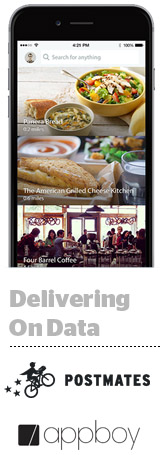
The growth and product teams at delivery service app Postmates count on the same types of data to do their respective jobs: in-app behavior data, engagement data, location data and campaign data.
All those data points, however, have to flow seamlessly for Postmates to balance the needs of its users, merchant partners and 65,000 couriers who make more than 2.5 million deliveries a month in 200 US cities.
“The challenge we’re always facing is how to effectively grow and scale out this marketplace,” said Tanner McGrath, lead product manager for growth engineering at Postmates.
Postmates’ promise to make deliveries within one hour requires an attention to detail, a focus on timing, smart personalization and data-driven decisioning.
For example, say the Postmates marketing team sends a message to several million users about a promotion, but there aren’t enough couriers in the fleet to make the deliveries on time.
“For one, you’ll have a lot of unhappy customers,” McGrath said. “But also think about how marketing activity, especially related to big events, sends a ton of traffic to the platform. It’s critical for engineers to have that information.”
Postmates has been working with mobile marketing automation platform Appboy, which recently raised $50 million in Series D funding, to stream its data at high volume and in real time to its partners for use across the organization.
Tanner and his team can export their data to their analytics provider Amplitude, for example, or to Amazon Redshift, which Postmates uses for cloud-based data warehousing.
Because of this bidirectional data flow, the queries Postmates runs within Amplitude or the observations from data housed in Redshift can be pumped back into Postmates and shared with everyone who needs it.
“You need to give real-time insight into all of the activities that are happening, like what the user is doing inside the app and how that usage may be changing, and then flow that information into other systems,” said Appboy CEO and co-founder Bill Magnuson.
Postmates also uses Appboy for life cycle management and as a CRM platform. The campaigns and messaging that Postmates run through Appboy are informed by the data streaming to and from the app via Appboy to other Postmates partners.
“Their machine learning model helps us better personalize the messages that are about to be sent out,” Magnuson said.
And when the results start to roll in, McGrath can make changes and decisions on the fly.
“Information that was very hard to get is now accessible the second you hit send,” McGrath said. “When you have a feedback loop like that, it’s a completely different thing than looking at the information weeks later, especially when you’re talking about an on-demand company like Postmates that needs to be real-time.”
But marketing people aren’t the only ones who want direct and easy access to customer engagement data. The entire company is interested in consuming that information, said McGrath, noting that his team alerts the engineering folks about every promotion before it runs.
“Typically, engineers might not be in the loop about everything happening from a marketing standpoint, but for us it’s critical to keep them informed,” he said. “If they see something changing, if they see metrics moving, they need to know why that’s happening from an infrastructure standpoint.”
Depending on the size of the campaign, Postmates has seen anywhere between a 33% and 100% improvement in spend efficiency as a result of streaming its data processing.
“We don’t think of our data as just marketing data – this is information about our customers and their engagement with Postmates,” McGrath said. “We learn about our users’ behavior, we run personalized campaigns and we optimize across the whole organization, from customer service to engineering to the core product teams.”
This post was syndicated from Ad Exchanger.

More Stories
Thursday, March 6 Cable Evening News Ratings: CNN’s The Arena Hunts For a 4 p.m. Foothold
Expo West Showcased a Maturing Commitment to Americans’ Food and Health
EssenceMediacom’s should’ve gone to Specsavers moment with new OOH ad